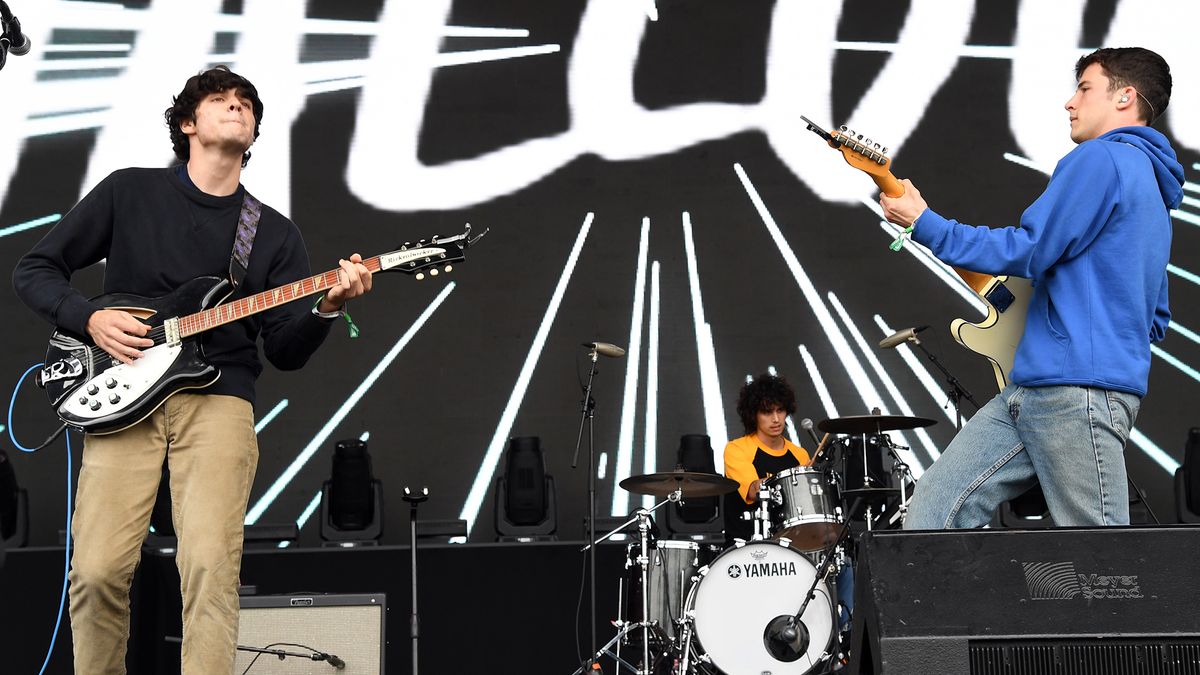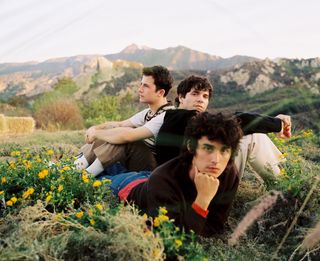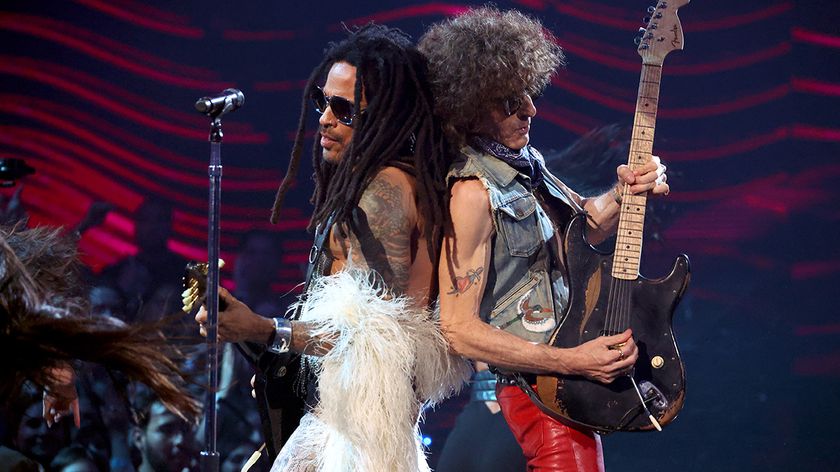Wallows: “There's that fine line of ‘I want to know where the guitar can take me’ and ‘I don't know where it can take me’”
Dylan Minnette, Braeden Lemasters and Cole Preston on why the guitar is their "comfort instrument", their favorite six-strings and the tracking secrets on new album, Tell Me That It's Over

On their soon-to-be-released second album Tell Me That It’s Over, Wallows mixes a hazy shade of alternative rock with synth pop and modern indie to create an eclectic yet satisfying listening experience.
The group are building off the success of their first album, Nothing Happens, and songs like Are You Bored Yet?, which has over a half-billion streams and saw them team up with the singer/songwriter Clairo.
Guitarists Dylan Minnette and Braeden Lemasters have also found time for acting careers in Hollywood, with Minnette doing a four-season stint on the Netflix show 13 Reasons Why, and playing one of the teens menaced by the Ghostface killer in the latest Scream installment.
Not content to sit behind his kit, drummer Cole Preston often picks up a guitar and is responsible for much of the keyboard work on the new album.
Meeting via video link, Wallows chatted to Guitar World about how they blended guitar and keyboard textures to produce a modern record that also honors classic '80s groups.

Let's talk a little bit about your songwriting process for this album. Do you guys write together, and what role does the guitar play in that process?
Lemasters: “During our early days, pretty much every song was written on guitar, and we would all just be in a room. I remember our first song Pleaser was three or four different song ideas that we meshed together. Like different guitar parts I had lying around and then Dylan came up with a guitar part.
Get The Pick Newsletter
All the latest guitar news, interviews, lessons, reviews, deals and more, direct to your inbox!
“A lot of our songs are a bunch of different ideas mixed together at the perfect time. But for this album, I feel like we always presented an idea to another person, and we usually try to build off that idea as much as we can from each other's influences.
“The guitar is my main instrument. I think Cole's unique because he’s an amazing drummer, a guitar player, and he's the best keyboard player. The thing about guitar is it can surprise you.
“A song like Missing Out has this huge chorus with distorted guitars going crazy, but the chorus used to be so different and just by putting on a distortion pedal you change the whole vibe. Obviously, the guitar's a very versatile instrument.”
I think that the guitar for all of us is sort of like the comfort instrument, we all feel comfortable enough to at least play chords and write a song on the guitar
Cole Preston
Minnette: “I think that I am the least experienced guitar player of the group. So, when I write, I don't necessarily write on guitar. I feel like I will feed off another guitar part that one of them has. It's harder for me to sit down with a guitar and start writing.
“Like Braeden will write an incoherent three-minute thing with four guitar riffs in it, and then we pinpoint one and take that out and then I'll be like, ‘How does that work over here?’ Or Cole just sends a full-fledged demo that's a two-and-a-half-minute song where he just wrote everything.
“I think the thing that I'm most proud of on the songs is that nothing happens the same way. Every second verse is either a different melody from the verse before or a totally different musical part than the verse that preceded it.”
Preston: “I think that the guitar for all of us is sort of like the comfort instrument – we all feel comfortable enough to at least play chords and write a song on the guitar. There was a part on our EP and Braeden said, 'I wanna hear what it sounds like it like – can you just go in and play it so I could sit here and listen?' With the guitar specifically, we definitely like trading off.”
The new single, Especially You, at least at first listen, doesn’t seem to feature a lot of guitar, but I do hear some funk chords on the chorus – maybe 7ths or 9ths.
Lemasters: “That song started out very pop. And then [after] we started working on it with [our producer] Ariel Rechtshaid [Vampire Weekend, Haim], [there was] a little more edge to it than the way it was originally written.
“I remember we were in the process of recording it, and I think it was Ariel's idea to add those chords. So, we just found them on the keyboard, and then I just found them on the guitar. It kind of reminds me of How Soon Is Now? by The Smiths. It's very dissonant in a way that really works with the melody.”
Minnette: “And there's that more modern guitar tone on the verse with its sort of distorted, computer-sounding guitar tone that mimics the bass riff as well. That was a riff that I happened to write.”
You mentioned the bass. You guys don't have a dedicated bass player in the band. Do you swap out the bass duties when recording?
Minnette: “We do. I feel like I, by default, become the bass player in the studio a lot of the time, just because if we're starting with live tracking I always want to pick up the bass since I'm not as good a guitar player as Braeden. And obviously Cole's the best drummer. So, I just end up picking up the bass because I can.
I'm sure some people think I'm the bass player of the band. They look at music videos and I'm always playing the bass
Dylan Minnette
“I feel like on the majority of songs on both of our albums I play the bass. But it changes. Sometimes we'll be writing parts as we go or change out a part where I play bass on a verse and then Braeden plays bass on the bridge and Ariel plays bass on the chorus.
“Sometimes it's just all over the place on this one, because Ariel kind of works in a particular way where he'll do stuff while we're gone. Like, 'Hey, I tried this.' and he'll send it to us, which is fun. He really surprised us sometimes.”
Lemasters: “There's a song or two that might just be Ariel on bass, like I Don't Want to Talk.”
Minnette: “That song took on a ton of different identities before we landed on what it was. The album is all over the map; it’s just a big collaboration between the four of us and also some guest performers as well.”
Lemasters: “Missing Out is Dylan and I on bass, which is funny. Dylan was on the chorus, and I'm on the verse and the outro.”
Minnette: “That’s because we kept your bass take from the demo. That song, Missing Out, started from a session with our friend and producer John DeBold and we made this random demo together, and it was Braeden totally just guessing through a bass riff, and we liked how weird it was and just kept it in.
“And then in the music videos I end up being the bass player as well. I'm sure some people think I'm the bass player of the band. They look at music videos and I'm always playing the bass. [laughs]”
This album is a progression from your early singles, which were more guitar-focused, and features a fair amount of synths and keyboards and a more early-‘80s sound. Do you guys just reach for whatever works for the song?
Lemasters: “Yeah, I think it's whatever serves the song. We're very open-minded when it comes to that. Like the band Wallows in general is not about a specific thing or genre or anything like that. I feel like we want to have the freedom to do whatever we want to, whatever inspires us.
“My 10,000-hour instrument is guitar; that's the one I played my whole life. My dad's a guitar teacher and that's why I play guitar. So, that's always going be part of my DNA, but that's also why piano's interesting and fun to write on, because I don't know what I'm doing as much.
“My big thing with guitar is I always want to try to not know what I'm doing as well. There's that fine line of ‘I want to know where the guitar can take me’ and ‘I don't know where it can take me.’
“River Phoenix once said that his acting was like a pot of gold and he didn’t want to mine it away and sell it. He wanted to keep it hidden and know it's there and just know there's this gem waiting to happen. I feel like that goes with the synths; there's some naivety to it that can just make a song more unique.
“Ariel had grand ideas for these songs. Like That’s What I Get used to be a full pop-rock, guitar song. And Ariel said, ‘Why don't we make it piano and strings like Kate Bush?’ So, we're open to anything.”
Minnette: “With this album we definitely wanted to maintain some of the qualities of Wallows that our fans fell in love with. I feel like this album is on one hand our most experimental in terms of songs like At the End of the Day, Hurts Me, and That's What I Get.
In all of this experimentation using synths and trying new sounds, the majority of the time that you hear the guitar, it's never the same
Cole Preston
“And then, on the other hand, it feels like familiar Wallows in the sense that it has some of the rawest-sounding songs as well. I guess you could label it garage or something. And that was intentional going into the recording process.
“For our first album, Nothing Happens, we really had the whole vision in mind, the track list, what the story was. We were just very hands on. Not that we weren't hands on with this one, but going into it, we didn't really have an end goal. We were sort of like, ‘We trust ourselves and our tastes.’ Let's just go in and not question the process and just let these songs find themselves and see what happens.”
When you guys were recording the guitar parts, did you work with external effects and re-amp stuff or did you go direct much of the time?
Preston: “In all of this experimentation using synths and trying new sounds, the majority of the time that you hear the guitar, it's never the same. Even on a song like Especially You, the first time you hear the guitar it's doing those tremolo seven chords and then you hear more of a straight, dry tone but then you get the computer distorted tone after that. And then you get a really nice reverb tone.
“Every time you hear the guitar, it's a totally different approach. I think Ariel maybe eight times out of 10 would just go direct. In his house, he had all this outboard stuff so he'd be able to route the signal any which way he wanted to, whether it was using a pedalboard that he had or the reverb in the rack, he had the freedom with the direct tone just to go whichever direction and minimize noise.
“But then some songs were more live tracked and there's feedback and Braeden would be in the room with a distortion pedal. And then there are a lot of instances where we were pitching a guitar tone an octave up, or on Guitar Romantic Search Adventure, in one of the verses, there's an acoustic that's pitched a whole octave down.”

Dylan, I think I've seen you with a white Fender American Vintage ‘62 Tele, correct?
Minnette: “Yes. I played that for a long time. It's interesting. On our last tour, I sort of ditched it. We were gifted this classic, standard Stratocaster. Like, I don't know what year it is. And this guy, Erik, who sets up all of our stuff for us, he just set up this Strat to have on the road as a backup guitar.
“Every time I played it, I was like, ‘This feels better to me.’ But it's funny, that Tele was my guitar for a long time, but I feel like the Strat in terms of what we are doing live has a more versatile sound to it. So, I actually want to work on this Strat a little more on this next tour and maybe refinish it, get a new color on it, because right now it's a gray.”
What acoustics have you guys been using?
Preston: “In the studio, Ariel had one guitar, a Martin, which was the most excellent acoustic guitar I've ever played. Immediately you're like, ‘This is the exact way that an acoustic guitar needs to sound.’
I really think every guitar has a different identity and a different song you can write with it
Braeden Lemasters
“There's a store in Los Angeles called Old Style and there's this fellow named Reuben Cox who finds guitars and fixes them. I have a nylon-string guitar that I bought from there that he told me he bought from some traveling dude in a van who collects guitars up and down the coast of California. Braeden, I think that's the guitar that you played on At the End of the Day.”
Braeden, I’ve seen you play Rickenbackers, a black one and a red one. What are you looking for in a guitar?
Lemasters: “I absolutely love my black Rick 360 – it's a 1996, the same year I was born, which is cool. What I look for in a guitar is definitely a very silky, smooth neck. My Rick is so nicely tapered, it just feels so good. I really think every guitar has a different identity and a different song you can write with it.
“I always get the most compliments on the black guitar, the black Rick. I have a Gibson Les Paul, which was one of my first guitars, which sounds fantastic, but that obviously lends itself to a heavier sound and it's kind of hard to escape it. But the Rick gets the most compliments. Even though my other Rick has the same pickups, it just sounds different.”

And how about amps? You use Fenders, yes?
Minnette: “We do. We're trying to figure out if we're going to keep using those or not; we're trying to figure out what amps we're going to use on this next tour. Braeden and I use the same amp, Hot Rod DeVille 212s. They're great amps. They're just ridiculously loud. Volume three is like eleven. It's crazy.”
As far as pedals go, I’ve seen Instagram photos with various Boss and EHX gear.
Lemasters: The [R3D] Kentaur. That's my go-to distortion pedal. There's also a Boss PS-5 Super Shifter pedal that I love and that I use on a couple songs like Hard to Believe, the first song of the album. That riff in the chorus is constantly shifting.”
Preston: “On the first record, when we worked with John Congleton, he introduced us to the Electro-Harmonix line of stuff like the SYNTH9, which has an OBX setting and these Moog settings.
“Our song Are You Bored Yet?, the little intro that's the first three seconds of the song is Braeden playing big chords into the SYNTH9. You wouldn't think that that's a guitar, but it is. It sounds lo-fi in a way that I think is still cool. It doesn't sound like you're playing a keyboard. It just sounds like this weird, screwed-up sound.”
Minnette: “I also use a Kentaur and I feel like that it’s almost always on. So, whenever I'm making a tone, it's building off of this distorted or just sort of gritty tone that always the same on the Kentaur just because it gives it a little bit of a punch.”
Looking ahead, what’s on tap for Wallows in 2022?
Minnette: “Honestly, just tons of shows, even beyond what we've announced already. We can't wait to get back on the road. There are also some songs that we didn't finish, that we started for this album, and that we're going to make sure see the light of day.
“I'm really happy with where we landed, because I feel like it's a perfect hybrid of everything that we went through during the recording process. I think at least 50 percent of the album is very much band music and the other 50 percent is also band music, just kind of different. That's what we wanted with this record.”
- Wallows' new album, Tell Me That It's Over, arrives March 25 via Atlantic Records.
Bruce is a freelance writer of features and interviews for Guitar World and MAGNET Magazine among other titles. He's played guitar in numerous garage bands with much better musicians who sometimes laugh at his Ovation Breadwinner.

“We had 15 minutes left, and it was time to go… I just started playing that riff. Then Lenny goes, ‘Whoa, what’s that?’”: Lenny Kravitz guitarist Craig Ross reveals the serendipitous roots of a Kravitz classic

“The concept of the guitar duel at the end was just appalling”: Crossroads is an essential piece of '80s guitar lore, but not every guitar legend was a fan of the film









